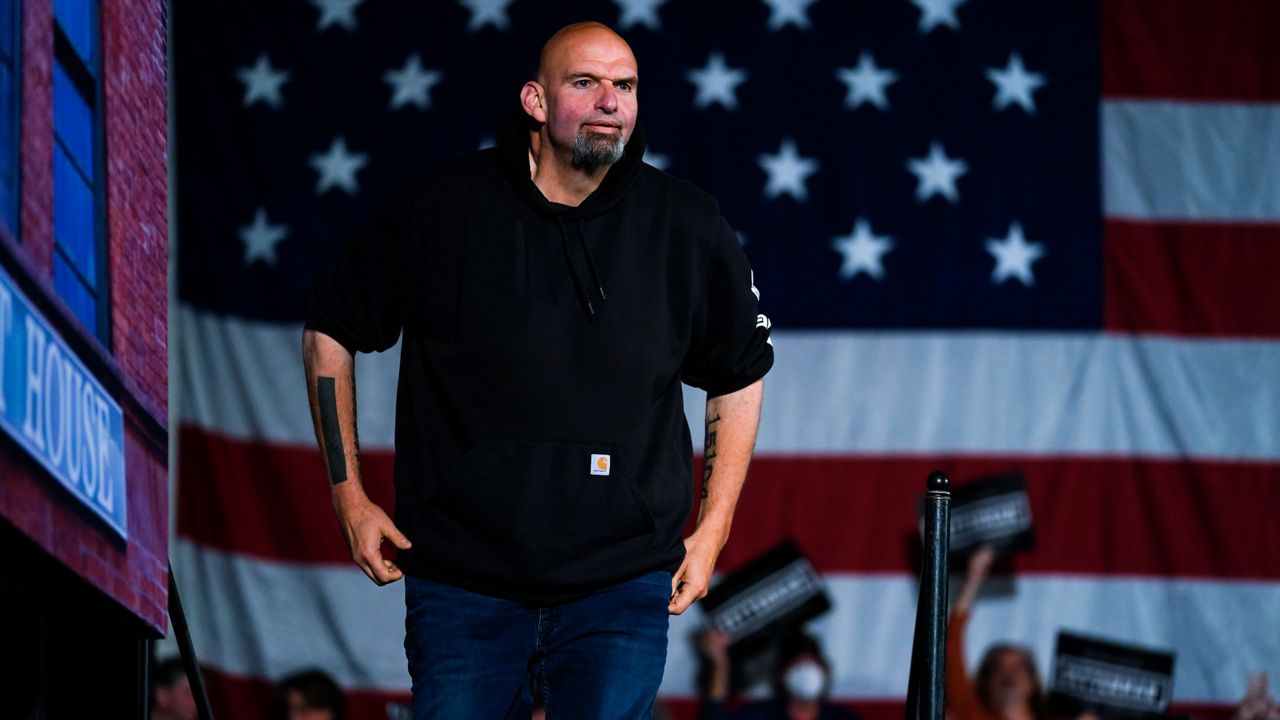Republicans went into Tuesday’s midterm election bullish about their chances about a “red wave” carrying them to huge majorities in the House and Senate, after spending months bashing Democrats about issues like inflation, crime and education.
But the so-called red wave ultimately did not materialize, with Democratic incumbents showing resilience in key races — and even making key pickups, like John Fetterman flipping Pennsylvania’s U.S. Senate seat from red to blue.
The balance of power of Congress is still up in the air, and Republicans could still win control, as Republican leader Kevin McCarthy told supporters in the early hours of Wednesday morning: “When you wake up tomorrow, we will be in the majority.”
But even with some key races like outstanding, it’s clear that Tuesday’s election defied historical trends. While Republicans had massive double-digit victories in states like Florida, Democrats held on to key House seats in states from Virginia to Kansas and claimed governors’ races in battleground states like Michigan, Wisconsin and Pennsylvania.
“While many races remain too close to call, it is clear that House Democratic Members and candidates are strongly outperforming expectations across the country,” House Speaker Nancy Pelosi said.
But as one defeated GOP candidate put it early Wednesday morning: “The RED WAVE did not happen.”
Here are a few takeaways from this year’s midterms so far:

Republicans started off Tuesday evening strong, with early results showing a rout in Florida.
Incumbent Gov. Ron DeSantis — who only won the governor’s race in 2018 by roughly 30,000 votes — swept to a massive re-election victory, including winning the once-Democratic stronghold of Miami-Dade County, which Hillary Clinton won by nearly 30 points in 2016.
Coupled with fellow GOP Sen. Marco Rubio cruising to victory against a strong Democratic challenger, Rep. Val Demings, more and more evidence appears to show that Florida may no longer be a “swing state.”
Despite the fact that former President Barack Obama carried the state twice — in 2008 and 2012 — and registered Democrats exceeded Republicans in 2020, the state has shifted rightward in recent years, thanks in part to an influx of new residents and the GOP making inroads with Latino voters.
Carlos Curbelo, a Republican former member of Congress, told The Associated Press that Florida is “off the map” for Democrats “for the foreseeable future.”
“Democrats really have to think about how they are going to rebuild there,” Curbelo said. “The Obama coalition no longer exists.”
DeSantis was not the only Republican governor to have a good night on Tuesday.
In Texas, Gov. Greg Abbott won a third term decisively, delivering Democrat Beto O’Rourke a devastating defeat — his third failed run for office in four years — despite record fundraising.
“Tonight, Texans sent a very resounding message,” Abbott said in a victory speech.
And Georgia Gov. Brian Kemp delivered Democrat Stacey Abrams a resounding defeat in a rematch of their high-profile 2018 race.
“It looks like the reports of my political death have been greatly exaggerated,” Kemp said, adding: “This election proves that when Republicans stay focused on real world solutions that put hard-working people first, we can win now, but also in the future.”

On the other side of the coin, Democrats claimed governorships in three key states that President Biden won in 2020, which may prove crucial in the battle for abortion rights and oversight of the 2024 presidential election.
In Michigan, Gov. Gretchen Whitmer won a second four-year term in Lansing, defeating far-right GOP candidate Tudor Dixon, a former political commentator and horror-film actress, in a re-election battle where abortion rights proved crucial. Whitmer led a statewide Democratic ticket that featured abortion as a centerpiece in the aftermath of the Supreme Court overturning Roe v. Wade over the summer.
"Whe prospect of leading this state for four more years is a privilege which we are incredibly grateful and excited about," Whitmer told supporters in Detroit. "We will always work with anyone who actually wants to solve a problem because there’s nothing more important than the people of this state to us — all of the people of this state."
Whitmer also threw her support behind a ballot measure enshrining abortion rights into the state's constitution, which voters approved.
In neighboring Wisconsin, incumbent Gov. Tony Evers defeated Republican Tim Michels, a Trump-backed candidate who espoused the former president's false claims of voter fraud in the 2020 election, to win another term in the statehouse.
Evers' win keeps a Democrat in power in battleground Wisconsin ahead of the 2024 election. In an audio recording released by a left-leaning political group, Michels was heard saying that "Republicans will never lose another election" if he was elected governor; Evers called Michels "a danger to our democracy" in a Twitter post in response to the comment. (Michels' campaign later clarified in a statement to Insider that
Michels favored disbanding the state’s bipartisan elections commission and had promised to sign bills vetoed by Evers that would make it harder to vote absentee.
Evers said his victory was a win for reproductive rights, public schools, clean energy and continuing to invest in the state’s infrastructure.
“You showed up because you saw our democracy was on the brink of existence and you decided to do a damn thing about it,” Evers told supporters in his victory speech.
Evers’ victory stood to guarantee that Democrats would still have a check on Republican power in the Legislature, as GOP attempts of winning enough seats to have a veto-proof supermajority looked to be unsuccessful.
In Pennsylvania, Democrat Josh Shapiro clinched victory in Pennsylvania’s gubernatorial race, a key Democratic hold in the Keystone State.
Shapiro, who faced off against Republican Doug Mastriano, served as the state’s attorney general for two terms before running for the governor’s seat. The Democrat smashed Pennsylvania’s campaign finance record in a powerhouse campaign in a year in which Democrats nationally faced headwinds, including high inflation.
“Tonight, voters from Gen Z to our seniors, voters from all walks of life, have given me the honor of a lifetime, given me the chance to serve you as Pennsylvania’s next governor,” Shapiro told a cheering crowd of hundreds in his victory speech.
Shapiro thanked his family and supporters and went on to tell the crowd that “real freedom won tonight” and “Democracy endured” in a race he characterized as a fight for the right to vote and the right to abortion.
At stake in the Keystone State’s gubernatorial elections were abortion rights, as well as management of the 2024 presidential election in a swing state that is often decisive. The governor’s office appoints the top election official for the state, which can affect major issues like the economy and abortion.
Shapiro’s victory makes him the first governor of Pennsylvania elected to succeed a member of his party since 1966.

Pennsylvania’s stature has risen in the U.S. Senate — by about 6 feet, 8 inches.
The Associated Press projected Wednesday that Pennsylvania’s Lt. Gov. John Fetterman defeated Republican Mehmet Oz in the state’s U.S. Senate race, giving Democrats a key pickup in the chamber and delivering the first Senate flip of the 2022 midterms.
“It's official,” Fetterman wrote on Twitter early Wednesday morning. “I will be the next U.S. Senator from Pennsylvania. We bet on the people of Pennsylvania - and you didn’t let us down And I won’t let you down. Thank you.”
In a speech early Wednesday morning, Fetterman told supporters he was "humbled" by their support and evoked his campaign slogan, "every county, every vote."
"And that's exactly what happened," he said. "We jammed them up. We held the line. I never expected that we were going to turn these red counties blue, but we did what we needed to do."
"This campaign has always been about fighting for everyone who has ever been knocked down, that ever got back up," Fetterman said. "This race is for the future of every community across Pennsylvania, for every small town, or person that ever felt left behind, for every job that has ever been lost, for every factory that was ever closed, for every person that works hard but never got ahead."
"I'm proud of what we ran on: Protecting a woman's right to choose, raising our minimum wage, fighting [for] the union way of life, healthcare is a fundamental human right," Fetterman said. "It saved my life, and it should all be there for you, if you ever should need it."
The election night win calls an end to a long, contentious contest, marked both by social media sniping and questions about Fetterman’s ability to handle the office after suffering a stroke on the campaign trail.
Fetterman began the race with a hefty lead in the polls, an edge that dwindled in the wake of a May stroke that kept him from the campaign trail and a debate performance that concerned some viewers due to his use of a captioning device – a move that Oz and his supporters used to try and paint Fetterman as unfit for office.
According to AP VoteCast data collected from likely voters ahead of Election Day, 52% of respondents said they were very or somewhat confident in Fetterman's ability to serve in Congress after suffering a stroke earlier this year, compared to 47% who were not.
But Fetterman’s campaign, which portrayed Oz as an outsider out of touch with Pennsylvanian’s everyday struggles, was effective enough to sway the election in his favor, as well as his positions on abortion and healthcare.

Republicans went into Tuesday's election predicting a massive "red wave" would sweep them into a dominant House majority, and possibly even swing the Senate. At one point last year, Republican leader McCarthy predicted the GOP could flip as many as 60 seats.
But as the results started to roll in, it was clear that the GOP would not get the Democratic wipeout they had hoped for.
Democratic Reps. Abigail Spanberger and Jennifer Wexton held off spirited Republican challengers in Virginia districts the GOP had hoped to flip. Ohio Rep. Marcy Kaptur held off a challenge from Republican J.R. Majewski, who was at the U.S. Capitol during the deadly Jan. 6, 2021, riot and who misrepresented his military service.
Democrats held House seats in Rhode Island, Ohio, Kansas and New Hampshire that Republicans were targeting. They also flipped some seats, including a suburban Illinois district, from Republicans.
Republicans needed a net of just five seats to reach a 218-seat House majority, which they appeared poised to accomplish.
They picked up a Nashville, Tennessee-area seat long held by Democrats. And in a dramatic example of the difficult political environment for Democrats, the party’s House campaign chairman Rep. Sean Patrick Maloney was fighting for political survival against Republican state legislator Mike Lawler in New York’s Hudson Valley. He would be the first Democratic campaign chief to suffer defeat in two decades.
But it's far from the "bloodbath" that some officials predicted.

Once again, a U.S. Senate race in Georgia is heading to a runoff election, with control of the chamber potentially on the line.
The top two candidates in Tuesday’s race — Incumbent Sen. Raphael Warnock, a Democrat, and Republican challenger Herschel Walker — will face off on Dec. 6 since neither candidate received 50% of the vote, Georgia secretary of state Brad Raffensperger said on Wednesday.
"There's one race in our state that is going to be moving to the December 6 runoff," he said. "That is the race for the United States Senate, between Senator Raphael Warnock and Herschel Walker. Our office has already begun the behind-the-scenes work to start building the ballots."
"It's a lot of work, but that's how the machinery of our democratic republic works," Raffensperger added. "We welcome it, because we know at the end of the day, everyone wants to know that we have honest and fair elections. And we do ask the voters to come out and vote one last time."
It’s a familiar position for Warnock, who was first elected to the Senate on Jan. 5, 2021, in a runoff election after neither he nor then-incumbent Sen. Kelly Loeffler garnered a majority of the vote in the general election on Nov. 3, 2020. Warnock ultimately won the race to fill the remaining two years of Republican Johnny Isaacson’s term by roughly 93,000 votes.
“We're not sure if this journey is over tonight or if there's still a little work yet to do,” Warnock told voters in the early morning hours of Wednesday. “I understand that at this late hour you may be a little tired, but whether it's later tonight or tomorrow or four weeks from now, we will hear from the people of Georgia.”
Similarly, Walker urged his supporters to "hang in there a little bit longer."
"I’m telling you right now: I didn’t come to lose," he added.
As of Wednesday, Warnock leads Walker by roughly 35,000 votes. Libertarian candidate Chase Oliver garnered a little more than 81,000 votes.
Looking back on 2020, victories from Warnock and his de facto “running mate,” Sen. Jon Ossoff, D-Ga., gave Democrats their 50-50 majority thanks to Vice President Kamala Harris’ tie breaking vote.
Georgia’s other high-profile race, the 2018 gubernatorial rematch between Democrat Stacey Abrams and Republican Gov. Brian Kemp was decided quickly, with the GOP incumbent surpassing 53% of the vote.

Aside from Georgia, a number of key races that will determine control of Congress for the remainder of President Biden's first term were still outstanding.
In Arizona, incumbent Sen. Mark Kelly leads Republican rival Blake Masters, a venture capitalist, but the race is still too close to call.
Kelly’s 2020 special election victory gave Democrats both of Arizona’s Senate seats for the first time in 70 years. It was propelled by the state’s fast-changing demographics and the unpopularity of then-President Donald Trump.
Kelly, who flew in space as a NASA astronaut and is married to former Rep. Gabby Giffords, thanked his family and supporters gathered in Tucson and said he was confident he would prevail once all ballots are counted.
“It’s been the honor of my life to represent Arizona in the United States Senate,” Kelly said. “And for as long as I’m there, I’ll be honest with you, I will protect our country and our democracy.”
The nail-biting race between Democratic incumbent Sen. Catherine Cortez Masto and Republican challenger Adam Laxalt remained too early to call after polls closed across Nevada Tuesday night.
Laxalt and Cortez Masto have been locked in a tight race for weeks, both hitting hard on national party talking points: Laxalt blaming inflation and illegal immigration on Democratic policies, and Cortez Masto promising to block GOP-led attempts at a nationwide abortion ban and to fight for a pathway to permanent citizenship for undocumented immigrants who came to the country as children.
Hours after the polls closed, both candidates told supporters that they expected to come out ahead.
“Our positive energy got us here today, and our positive energy is going to continue to flow this week,” Cortez Masto said from a Democratic watch party on the Las Vegas strip. “We are gonna get this done.”
“We are exactly where we want to be in this race. We have a lot of votes coming in across the state yet,” Laxalt told supporters at a Las Vegas casino. “We are going to win this race.”
The outcome of the two Arizona and Nevada races may not be known for days because both states conduct elections in part by mail ballots, which take a long time to count.
The Associated Press projected that Wisconsin Sen. Ron Johnson eked out a win over Democrat Mandela Barnes, bolstering Republicans' figures in the chamber. And while Alaska's Senate race has not yet been called, the contest is expected to be won by one of the two leading Republican candidates.
After Fetterman's flip, Republicans need to win two of Georgia, Nevada or Arizona in order to win control of the Senate.
The Associated Press contributed to this report.
Spectrum News' Austin Landis, Rachel Tillman, Eden Harris, David Mendez and Justin Tasolides contributed to this report.



